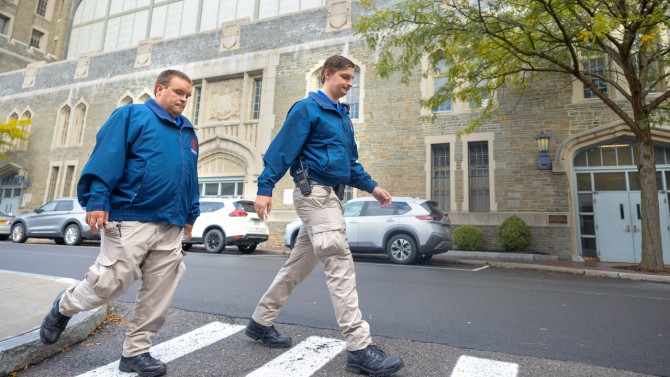
Alex Sanford, left, and Sean O’Callahan serve as public safety ambassadors with the goal of reducing the need for police intervention in noncriminal incidents on campus.
Public safety ambassadors safeguard campus
By Blaine Friedlander, Cornell Chronicle
A new team of unarmed security professionals is supporting the campus community with daily functions that don’t require police officers, such as giving directions, helping with stuck elevators or lost keys, managing crowds and escorting visitors.
Part of the Public Safety Division, the public safety ambassadors don’t carry weapons, don’t wear police uniforms and have no power to make arrests or enforce laws – though they might summon police if needed. Like the Community Response Team, a year-old crisis response group, they’re intended to reduce law enforcement’s intervention in noncriminal and nonviolent incidents.
The team was launched in September with two full-time ambassadors and a manager; eventually, it will comprise six ambassadors.
“We found police were handling basic public safety calls that don’t necessarily require a police officer,” said David Honan, associate vice president for public safety. “The public safety ambassadors can provide extra eyes and ears in case medical help, firefighters or police are needed. They’re there to provide a service, caring for our community.”
Both the public safety ambassadors and the Community Response Team were formed in response to a 2021 report from the Public Safety Advisory Committee. That committee – which comprised students, faculty and staff – was tasked by then-President Martha E. Pollack with assessing and reimagining public safety at Cornell after the killing of George Floyd in 2020.
The committee recommended creating an alternative model to make the campus less reliant on law enforcement – both to avoid potentially escalating interactions and to free up police to do more actual policing, said Conor Hodges ’21, who helped develop the 2021 report.
“You get a wide spectrum of things people are calling 911 about – it can be everything from ‘my roommate cooked meat in my pan and I’m a vegan’ to ‘there’s a dog in a hot car and I’m worried about it’ to ‘there’s a burglary in progress,’” said Hodges, now pursuing a doctoral degree in history and African American studies at Yale University. “If you have to send all of these calls to law enforcement, then you’re not using your resources effectively.”
The alternative policing model is still relatively new; similar programs are underway in other universities and cities, including the University of Virginia, the University of Chicago and the city of Cleveland.
“It’s amazing to me how quickly everyone has recognized the value in this,” Hodges said.
At Cornell, the public safety ambassadors are New York state-certified security guards, with additional training in areas including communication, de-escalation and first aid. They collaborate with CUPD, the Community Response Team, Cornell EMS, Environmental Health and Safety, and Student and Campus Life, as well as regional agencies.
“We exist to be ambassadors to the community, and to promote public safety,” said Bryant Carpenter, public safety ambassadors manager. “When they’re out there doing their duties, one of their most important qualities will be empathy – being engaged with the community, listening to its needs and building relationships.”
In addition to patrolling campus and helping to secure events, the ambassadors test Blue Light Phones to ensure they’re working, help direct traffic and respond to calls. The team will also reduce the need to hire temporary external security guards, Honan said, although these will still be needed for massive events such as Slope Day.
Public safety ambassador Alex Sanford said that his reception by students so far has been very positive.
“I say, ‘Hi, I’m Alex. I’m a public safety ambassador. We are unarmed security for campus, and we help the CUPD with nonemergency and non-life-threatening calls,’” said Sanford, who is also a volunteer firefighter. “I love helping the community, and interacting with the community.”
Media Contact
Get Cornell news delivered right to your inbox.
Subscribe

